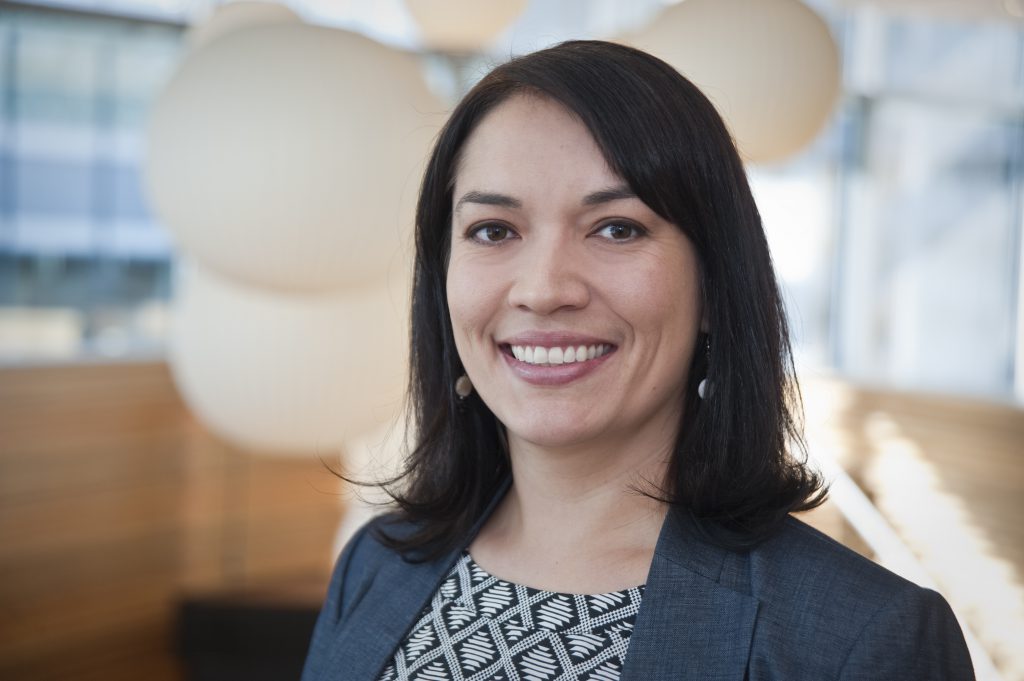
Dr. Nanibaa’ A. Garrison, a faculty member in the Treuman Katz Center for Pediatric Bioethics, studies ethical issues surrounding genetic research with Native American communities. She is also a member of the Navajo Nation, so her professional field of research is closely linked to her personal background.
She sat down with On the Pulse for a Q&A about her bioethics research and clinical interests.
How did you get interested in this type of research?
I became interested in bioethical issues in genetics when I saw that tribes were hesitant to participate in this type of research. I’m a member of the Navajo Nation, where I was born and raised. I was aware of the cultural issues and history surrounding Native Americans and medical research, and I wanted to bridge both worlds using my scientific training.
What is an example of past events that influenced Native Americans’ thinking on research participation?
As with other minority populations, some research in the past was done under false pretenses or done improperly. The Havasupai Tribe in Arizona, for example, discovered in 2003 that their DNA samples had been used without their approval for studies on schizophrenia, patterns of migration and inbreeding. They had consented to have their DNA collected for genetic studies on type 2 diabetes. The tribe sued over this secondary use of their samples and won a settlement of monetary compensation and the return of their DNA samples.
What research project are you working on now?
I’m studying attitudes and perspectives towards genetic research among Native American populations. I’m conducting interviews at national conferences and by phone to learn what influences Native Americans to take part in research or not. I’ve spoken with policymakers, tribal leaders, Native American physicians and tribal members who help oversee scientific research projects.
Through focused discussions, I am identifying issues and barriers to American Indian participation in genetics research, with a focus on achieving geographical diversity of representation in all U.S. states, including Alaska and Hawaii. In almost all of the interviews I’ve conducted, tribal leaders allude to the Havasupai case—it’s an important undertone that frames why I am doing this work.
What is the goal of your research?
Native Americans struggle with health issues more than the general population, and there are opportunities to improve health in these communities through ethically sound scientific research. But researchers need to be respectful of cultural and privacy issues. I hope to regain trust and facilitate research to happen in ways that respect Native American viewpoints.
By listening, incorporating feedback and bringing Native Americans into a conversation about scientific research, we are doing what is called “community-engaged research.” Tribal leaders want to know what samples researchers will need and how the samples will be used. They want to know how their communities will benefit from this research.
All of that seems straightforward, but there is a history where these simple actions were not taken. That hurts trust. So a large part of what I do is listen to concerns and synthesize that information in a meaningful way. Part of bioethics is determining ethical ways to conduct research and ensuring that researchers share what is learned with the research participants.
What have you been learning in these conversations with tribal leaders and others?
I hear over and over again how protective tribal leaders feel about their community members. For most tribes, there are many other pressing health issues, so genetic research isn’t necessarily at the top of their priority list. They understand that genetics is a part of many of these health concerns, but they don’t think about genetic tools to tackle them. This goes back to why it’s so important that tribal leaders be at the table for discussions about genetic research, so that they realize how this information and technologies can be harnessed to further their tribe’s well-being.
How will you use what you have learned?
I will share my findings with the National Congress of American Indians, a board that represents the interests of many tribes and sets policy at the federal and tribal level.
I’m also excited to promote sharing of information among tribes, so that they can learn from what others are doing.
I am working closely with the Center for Diversity and Health Equity at Seattle Children’s on the best ways to approach communities about research participation. It’s gratifying to contribute to knowledge through research, and to influence policy at a national level. This can help repair past strains in relationships, and strengthen future research that involves Native Americans.
Resources
- Treuman Katz Center for Pediatric Bioethics
- Center for Diversity and Health Equity

